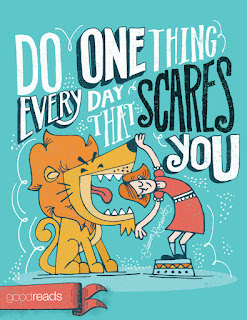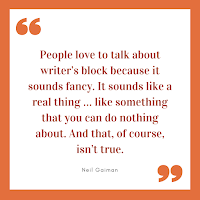A Guide Against Writer's Block
Writer’s block can occur at any moment, even to the most seasoned of writers, making it difficult to string as little as two cohesive sentences together. When this happens, it can be disheartening as well as frustrating, so it’s important to develop ways of combating writer’s block by finding your inspiration and get back your flow.
What is writer’s block?

Writer’s block manifests different for each person so it is important to recognise it when it does occur. Adverse symptoms may include mental fogginess, the inability to focus, feeling stressed or frustrated by your writing, and often a general lack of inspiration. The good news is writer’s block is only temporary and eventually it will subside.
Inspiration is integral for our creativity. Our inspiration
is synonymous with our enthusiasm. It drives us. It stimulates us. However,
like the writing teachers of MasterClass.com
said, “inspiration isn’t something that is going to strike you without any
effort on your part”. To help fight writer’s block and reignite your
inspirational here are some creative tips for finding inspiration to get you
back on track at writing the next best seller.
Read
I know, a book blogger telling you to read, shocking! But it’s true. Great writing inspires great writing. Pick up a novel by your favourite author, or one you’ve never read before, and pay attention to the realistic characters, beautiful prose, and exciting plots. What do you like about them? How does the style of writing affect your interpretation of the story? Why do you like your favourite characters? All of these can help carve your own writing style and help you to understand what you want to achieve in your own writing. George R.R. Martin has said on his website that “every writer has something to teach you, for good or ill. (And yes, you can learn from bad books as well as good ones — what not to do).” For some added inspiration why not read through some magazine and newspaper articles, blogs, short stories, and non-fiction books to see more styles of writing.
Travel
The time old saying is to “write what you know”, so of course it makes sense to go out and get some life experience to help your writing feel as authentic as possible. How better to really describe the sound of waves or the feel of clay between your fingers or the taste of siracha than going out and seeing them for yourself. You don’t necessarily need to go on a 6-month journey abroad in a foreign country (unless of course you really want to) to create a vivid and accurate story. Try a different neighbourhood or explore local tourist attractions to inspire new settings in your work. Expanding your experience and list of places you’ve been to can develop well-rounded characters and world building in unexpected and creative ways. Take a notebook with you and write about where you are.

Ransom Riggs collected old photographs from a young age because he loved photography. These photographs began to reveal a pattern of taste, “Edward Gorey-esque Victorian creepiness” as he calls it, which lead to the idea of writing a book about them. Thus was the beginnings of Miss Peregrine’s Home for Peculiar Children. Paintings, digital art, sculptures, tattoos, and concept art from films are all fantastic ways for sparking inspiration. Toni Morrison said in an interview for OMagazine that once an image was in her head she would go forward, “starting out with an image, even if I don’t know yet how to squeeze it, how to use it” to create her story. Try looking at an image of a person and imagine their story, or perhaps look at a fictional creature and imagine how they might disrupt or alter our world.
Listen to Music
Music is another form of storytelling, conjuring images and emotions unconsciously the same way that reading can. There’s a reason we associate different songs with different emotions. Expand your listening experience and use the emotions evoked to better understand and express how your character feels when cheerful, betrayed, triumphant, inconsolable etc. What song goes best with the theme of your blog article? Try creating a playlist of songs that inspires you or transports your imagination to a place of creativity.
Get Out of Your Comfort ZoneSometimes the biggest roadblock to creative inspiration is monotony. The same routine day in and day out can begin to sterilise your creativity because nothing is stimulating or challenging your imagination. Of course, you don’t need to go skydiving to escape your comfort zone, reading a genre you’ve never read before can be a simple step out of your safe zone. Maybe it’s a trip to a park or beach you’ve never been to, or to stop into that restaurant you’ve only ever walked past, or perhaps there’s a concert on you wouldn’t normally go to. Better yet, try a new hobby! Maybe your character is really into baking?
Have a Break
Sometimes writer’s block is our mind’s way of saying
it’s overheating and needs a cool down period before booting up again. Taking a
break from writing isn’t giving up, nor should it be considered unproductive.
Stepping away from the keyboard or writing pad can help us relax and ease
stress. It’s also a good opportunity to catch up on those other personal and
social obligations you’ve been putting off in favour of getting your writing
done. Take this opportunity to do some of the above and whether your break is
an hour, a day, a week, or even a month sometimes the trick to combating writer’s
block is to step away and come back with fresh eyes.
Inspiration comes and goes in unpredictable ways. What
can be predictable is whether you allow a writing block to get you down and
prevent your creative works from being finished. Writer’s block is something
all writers face from time to time and it’s completely normal. If you’re really
struggling with your creativity, find out what inspires your favourite writers that
helps them avoid or overcome writer’s block. BookFox has a great article to
help: How 50 Famous
Authors Find Writing Inspiration.
The important thing is to find what works for you.
What inspires you?





Comments
Post a Comment